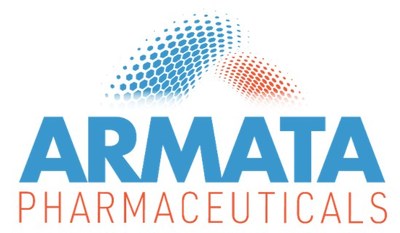Armata Pharmaceuticals Highlights Positive Results from Phase 2a diSArm Study of its Staphylococcus aureus Bacteriophage Cocktail, AP-SA02, in Late-Breaking Oral Presentation at IDWeek 2025™
Rhea-AI Summary
Armata Pharmaceuticals (NYSE American: ARMP) reported positive Phase 2a diSArm results for IV bacteriophage cocktail AP-SA02 in complicated Staphylococcus aureus bacteremia, presented at IDWeek 2025 on Oct 22, 2025. The randomized, double-blind trial enrolled 42 patients (29 AP-SA02 + BAT; 13 placebo + BAT).
Day 12 clinical response: 88% vs 58% (PI assessment, p=0.047); adjudicator assessment 83% vs 58%. Non-response/relapse at one week post-BAT and at EOS: 0% AP-SA02 vs ~25% placebo (p-values 0.017–0.025). AP-SA02 was well tolerated; no serious adverse events related to drug. Armata plans a Phase 3 superiority trial in 2026, subject to FDA feedback.
Positive
- Day 12 clinical response 88% (AP-SA02) vs 58% (placebo, p=0.047)
- Non-response/relapse 0% with AP-SA02 at one week post-BAT and EOS
- Trial enrolled 42 patients (29 AP-SA02, 13 placebo) supporting Phase 3 planning
- No serious drug-related SAEs reported in the study
Negative
- Small sample size of 42 patients limits statistical power and generalizability
- Treatment-emergent adverse events occurred in 6% (2/35) of AP-SA02 subjects
News Market Reaction
On the day this news was published, ARMP gained 103.17%, reflecting a significant positive market reaction. Argus tracked a peak move of +319.0% during that session. Our momentum scanner triggered 52 alerts that day, indicating high trading interest and price volatility. This price movement added approximately $301M to the company's valuation, bringing the market cap to $592M at that time. Trading volume was exceptionally heavy at 1363.0x the daily average, suggesting very strong buying interest.
Data tracked by StockTitan Argus on the day of publication.
The abstract, titled, "A Phase 2a Randomized, Double-Blind, Controlled Trial of the Efficacy and Safety of an Intravenous (IV) Bacteriophage Cocktail (AP-SA02) vs. Placebo in Combination with Best Available Antibiotic Therapy (BAT) in Patients with Complicated Staphylococcus aureus Bacteremia," was accepted as a highly coveted late-breaking abstract for oral presentation, and was presented by Dr. Loren G. Miller, M.D., M.P.H., Professor of Medicine, David Geffen School of Medicine at UCLA, Chief, Division of Infectious Diseases at Harbor-UCLA Medical Center and the Lundquist Institute.
"The results of the diSArm study confirm, for the first time in a randomized clinical trial, the efficacy of intravenous phage therapy for S. aureus bacteremia, and we are very pleased to highlight these compelling data in an oral presentation at IDWeek," stated Dr. Miller. "The results of this rigorously designed study provide strong rationale for advancement into a Phase 3 superiority study that, if successful, would support its use in clinical practice for Staphylococcus aureus bacteremia. High-purity, phage-based therapeutics like AP-SA02 have the potential to become the new standard of care for this common, extremely severe, and often deadly infection."
"The positive results from the diSArm study represent another significant achievement for Armata as we aim to advance AP-SA02 into a pivotal trial," stated Dr. Deborah Birx, Chief Executive Officer of Armata. "I would like to thank Dr. Miller and the other investigators who contributed to the efficient execution of the diSArm study, and I look forward to working with many of them on a proposed pivotal study next year. I would also like to thank Dr. Vance Fowler who served as the chair of the independent blinded adjudication committee that independently confirmed safety and efficacy findings throughout the Phase 2 trial. Finally, I would like to express my gratitude to the patients who participated in this important study, and acknowledge our partners at the
Data highlights:
The Phase 2a study enrolled and dosed 42 patients, with 29 randomized to AP-SA02 in addition to BAT and 13 to placebo (BAT alone). Methicillin-resistant S. aureus ("MRSA") was the causative pathogen in ~
Clinical response was assessed in the intent-to-treat (ITT) population at Test of Cure ("TOC") on day 12, one week post-BAT, and End of Study ("EOS") four weeks after BAT completion. Safety analysis also included data from the Phase 1b portion of the trial (n=8).
Day 12 clinical response rates were higher in the AP-SA02 group —
Non-response/relapse rates were evaluated at the two later timepoints — one week post-BAT and EOS. No patients in the AP-SA02 group experienced non-response or relapse (
Patients treated with AP-SA02 showed trends toward rapid normalization of C-reactive protein, shorter time to negative blood culture, quicker time to resolution of signs and symptoms at the infection site, shorter intensive care unit and hospital utilization.
AP-SA02 was well-tolerated with no serious adverse events related to the study drug. Treatment-emergent adverse events occurred in
New findings demonstrate that the defined and reproducible genomic variants present in AP-SA02 Drug Product may provide an immediate advantage, enabling rapid, strain-specific response to each patient's S. aureus isolate. These characterized variants can expand from as little as
Conclusions:
- AP-SA02, combined with BAT, had a higher and earlier cure rate compared to placebo in patients with complicated SAB at day 12 as assessed by both blinded site investigators and independent adjudicators.
- No patients who received AP-SA02 demonstrated non-response or relapse at one week post-BAT or at EOS, as assessed by both blinded site investigators and the independent adjudication committee, compared with approximately
25% in the placebo group. - AP-SA02 appears safe with clinical efficacy against both MRSA and methicillin-sensitive S. aureus ("MSSA") and trends toward earlier resolution and shorter hospitalization, with no evidence of relapse four weeks post-therapy.
- Defined phage variants in AP-SA02 Drug Product ensure an intrinsic adaptive mechanism — a flexibility that may be key to achieving effective phage therapy from patient to patient.
- These results strongly support advancement into a pivotal Phase 3 trial that Armata plans to initiate in 2026, subject to review and feedback from the
U.S. Food and Drug Administration (the "FDA"). The Company is engaged with the FDA regarding a potential superiority trial design.
About IDWeek 2025™
IDWeek 2025™ is a joint annual meeting of the Infectious Diseases Society of America (IDSA), the Society for Healthcare Epidemiology of America (SHEA), the HIV Medicine Association (HIVMA), the Pediatric Infectious Diseases Society (PIDS) and the Society of Infectious Diseases Pharmacists (SIDP). With the theme "Advancing Science, Improving Care," IDWeek features the latest science and bench-to-bedside approaches in prevention, diagnosis, treatment and epidemiology of infectious diseases, including HIV, across the lifespan. IDWeek 2025™ takes place October 19-22 in
About AP-SA02 and diSArm Study
Armata is developing AP-SA02, a fixed multi-phage phage cocktail, for the treatment of complicated bacteremia caused by Staphylococcus aureus (S. aureus), including methicillin-sensitive S. aureus (MSSA) and methicillin-resistant S. aureus (MRSA) strains.
The diSArm study (NCT05184764) was a Phase 1b/2a, multicenter, randomized, double-blind, placebo-controlled, multiple ascending dose escalation study of the safety, tolerability, and efficacy of intravenous AP-SA02 in addition to best available antibiotic therapy (BAT) compared to BAT alone (placebo) for the treatment of adults with complicated S. aureus bacteremia. The results from the diSArm study are an important step forward in Armata's effort to confirm the potent antimicrobial activity of phage therapy and the completion of the study represents a significant milestone in the development of AP-SA02, moving Armata one step closer to introducing an effective new treatment option to patients suffering from complicated S. aureus bacteremia.
The Phase 1b/2a clinical development of AP-SA02 was partially supported by a
About Armata Pharmaceuticals, Inc.
Armata is a clinical-stage biotechnology company focused on the development of high-purity pathogen-specific bacteriophage therapeutics for the treatment of antibiotic-resistant and difficult-to-treat bacterial infections using its proprietary bacteriophage-based technology. Armata is developing and advancing a broad pipeline of natural and synthetic phage candidates, including clinical candidates for Pseudomonas aeruginosa, Staphylococcus aureus, and other important pathogens. Armata is committed to advancing phage therapy with drug development expertise that spans bench to clinic including in-house phage-specific current Good Manufacturing Practices ("cGMP") manufacturing to support full commercialization.
Forward Looking Statements
This communication contains "forward-looking" statements as defined by the Private Securities Litigation Reform Act of 1995. These statements relate to future events, results or to Armata's future financial performance and involve known and unknown risks, uncertainties and other factors which may cause Armata's actual results, performance or events to be materially different from any future results, performance or events expressed or implied by the forward-looking statements. In some cases, you can identify these statements by terms such as "anticipate," "believe," "could," "estimate," "expect," "intend," "may," "plan," "potential," "predict," "project," "should," "will," "would" or the negative of those terms, and similar expressions. These forward-looking statements reflect management's beliefs and views with respect to future events and are based on estimates and assumptions as of the date of this communication and are subject to risks and uncertainties including risks related to Armata's development of bacteriophage-based therapies; ability to staff and maintain its production facilities under fully compliant cGMP; ability to meet anticipated milestones in the development and testing of the relevant product; ability to be a leader in the development of phage-based therapeutics; ability to achieve its vision, including improvements through engineering and success of clinical trials; ability to successfully complete preclinical and clinical development of, and obtain regulatory approval of its product candidates and commercialize any approved products on its expected timeframes or at all; and Armata's estimates regarding anticipated operating losses, capital requirements and needs for additional funds. Additional risks and uncertainties relating to Armata and its business can be found under the caption "Risk Factors" and elsewhere in Armata's filings and reports with the
Armata expressly disclaims any obligation or undertaking to release publicly any updates or revisions to any forward-looking statements contained herein to reflect any change in Armata's expectations with regard thereto or any change in events, conditions or circumstances on which any such statements are based.
Media Contacts:
At Armata:
Pierre Kyme
ir@armatapharma.com
310-665-2928
Investor Relations:
Joyce Allaire
LifeSci Advisors, LLC
jallaire@lifesciadvisors.com
212-915-2569
![]() View original content to download multimedia:https://www.prnewswire.com/news-releases/armata-pharmaceuticals-highlights-positive-results-from-phase-2a-disarm-study-of-its-staphylococcus-aureus-bacteriophage-cocktail-ap-sa02-in-late-breaking-oral-presentation-at-idweek-2025-302590906.html
View original content to download multimedia:https://www.prnewswire.com/news-releases/armata-pharmaceuticals-highlights-positive-results-from-phase-2a-disarm-study-of-its-staphylococcus-aureus-bacteriophage-cocktail-ap-sa02-in-late-breaking-oral-presentation-at-idweek-2025-302590906.html
SOURCE Armata Pharmaceuticals, Inc.








